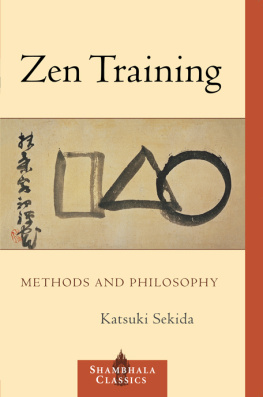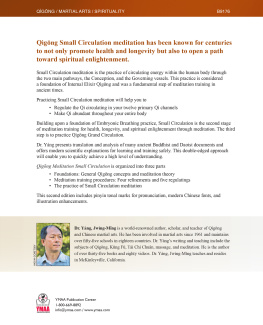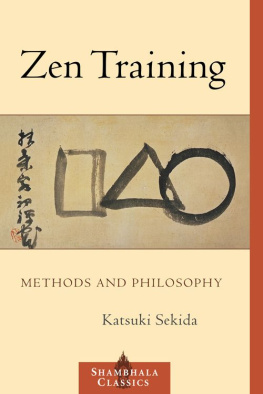ZEN TRAINING
TRAINING
METHODS AND PHILOSOPHY
Katsuki Sekida
edited, with an introduction, by A. V. Grimstone

SHAMBHALA
Boston & London
2012
SHAMBHALA PUBLICATIONS, INC.
Horticultural Hall
300 Massachusetts Avenue
Boston, Massachusetts 02115
www.shambhala.com
1985 Katsuki Sekida and A. V. Grimstone
Cover art: Circle, Triangle, Square, by Sengai.
Reproduced with permission of Idemitsu Museum of Arts, Tokyo.
All rights reserved. No part of this book may be reproduced in any form or by any means, electronic or mechanical, including photocopying, recording, or by any information storage and retrieval system, without permission in writing from the publisher.
Library of Congress Cataloging-in-Publication Data
Sekida, Kazuki, 1893
Zen training: methods and philosophy/ Katsuki Sekida; edited with an introduction by A. V. Grimstone.
p. cm.
Originally published: New York: Weatherhill, 1975.
Includes bibliographical references and index.
eISBN 978-0-8348-2583-3
ISBN 978-1-59030-283-5 (pbk.: alk. paper)
1. MeditationZen Buddhism. 2. Zen BuddhismDoctrines.
I. Grimstone, A.V. Title.
BQ9288.S4313 2005
294.34435dc22
2005048965
I SHOULD LIKE to express here my thanks to all those who have helped and encouraged me in the writing and publishing of this book. Parts of it originally appeared in Diamond Sangha, the publication of the Zen group of Honolulu, and I must first express my feeling of gratitude to Mr. Robert Aitken, who initially edited my articles and prepared them for publication in Diamond Sangha, and to Mrs. Anne Aitken, who typed my manuscripts and generally spared no effort in the work of getting them printed. Without their helping hands, encouragement, and the hospitality of the pages of Diamond Sangha, those articles would never have appeared. This also is the place to express my gratitude to the readers of Diamond Sangha for their steady encouragement; it has meant much to me.
The articles that appeared at that time were independent of each other and were published separately. The work of organizing those articles into book form, of editing the material that I added later, and of writing the introduction was undertaken by Dr. A. V. Grimstone, in Cambridge, England. I wish to thank him most warmly for the care he has devoted to the task, and for his many helpful suggestions. He has worked on the book as if it were his own.
I also wish to thank Miss Debra Graynom, of the Maui Zendo, who helped me by typing some parts of the manuscript, and more generally I want to express my gratitude for the encouragement given me by the members of the Zen groups of Honolulu and Maui, and the members of the London Zen Society. Among the latter I particularly want to thank Mr. Geoffrey Hargett for suggesting .
I hope that this book will be of interest and help to those who wish to study Zen. Good luck in your Zen practice!
KATSUKI SEKIDA
Kochi Prefecture, Japan, 1975
ACKNOWLEDGMENTS
The author and editor wish to express their gratitude to the following for granting permission to reprint published material: Chatto and Windus, Random House, and the literary estate of C. K. Scott-Moncrieff for extracts from Scott-Moncrieffs translation of Marcel Prousts Swanns Way and Within a Budding Grove; the University of Illinois Press for a figure from the American Journal of Psychology; R. D. Laing and Penguin Books for an extract from The Politics of Experience and The Bird of Paradise, 1967 by R. D. Laing; David Magarshack and Penguin Books for passages from the formers translations of Dostoevskis The Idiot and The Devils, 1953, 1955 by David Magarshack; A. C. Guyton and W. B. Saunders Company for material from Function of the Human Body; Iris Murdoch and Routledge and Kegan Paul for passages from The Sovereignty of Good; Manchester University Press and the University of Chicago Press for an extract from Karl Jaspers General Psychopathology, translated by J. Hoenig and Marian W. Hamilton; and Macmillan Publishing Company and Allen and Unwin for a passage from Edmund Husserls Idea of Phenomenology, translated by W. P. Alston and G. Nakhnikian in Readings in Twentieth-Century Philosophy.
THE AUTHOR OF THIS BOOK, Katsuki Sekida, was born in Kochi, a town in the southwest of Japan, in 1893. He began the practice and study of Zen in his early twenties, in circumstances that are partly described in chapter 16 of this book, and has continued this uninterrupted ever since. His experience therefore extends over almost sixty years. Although his study and practice of Zen have been intense and profound, and although he lived and studied for some years in a Zen monastery, Ryutaku-ji, he has always remained a layman, earning his living as a schoolteacher until his retirement in 1945. In his later years he has become greatly respected as a teacher of Zen. These few biographical facts are important to the reader, I believe, since they help to establish that this book is the work of a man who can write of Zen with the authority of prolonged experience and deep study.
In 1963, Mr. Sekida accepted an invitation to go to Honolulu to join a Zen group that had been founded there at the initiative of Robert Aitken, and he remained in Hawaii until 1970. It was in Honolulu that Mr. Sekida began working on an expanded English version of a book he had written in Japanese, An Introduction to Zen for Beginners, and early drafts of various chapters of this book were circulated with a newsletter, Diamond Sangha, published by the Honolulu Zen group. I met Mr. Sekida in 1968, when I was working in Honolulu for a time, and again in 1971, when he came to England for several months at the invitation of the London Zen Society. At that time he asked me if I would assist him in the final preparation of his manuscript for publication. I gladly agreed to do this, since it seems to me that his ideas are interesting and important and his book is a most valuable one. I can claim no profound knowledge or experience of Zen myself, but in the course of my professional activities as a scientist I have acquired a certain experience of writing and editing, and it seemed to me that it was this that Mr. Sekida chiefly needed, rather than a deep knowledge of his subject. Mr. Sekida completed his manuscript in 1972, and the final version is now before the reader.
Mr. Sekida also asked if, in addition to editing the book, I would write an introduction to it. With some diffidence, I agreed to do this. The book is, I believe, well able to stand by itself, and the reader will lose little if he proceeds straight to chapter 1. However, Mr. Sekidas view of Zen is different in many respects from that which has previously been presented to Western readers, and a few words of explanation at the outset may help some readers to orient themselves in unfamiliar territory and to relate what is said here to what is to be found in other books. In particular, I think it may be useful to state explicitly some of the things that Mr. Sekida takes for granted and does not comment on.
For Mr. Sekida the unquestioned basis of any serious practice of Zen is zazen, the exercise in which the student sits and learns to control his body and mind. A substantial part of the book is devoted to describing how zazen is performed and what its effects are. Perhaps for some readers this concentration on zazen will need justification, for in Daisetz T. Suzukis writings, which were chiefly responsible for introducing Zen to the West, no such emphasis is to be found, and this inevitably influenced those introductory books on Zen that were largely based on his work. Suzuki wrote about Zen largely from a theoretical and cultural viewpoint and was not much concerned with the practical aspects of Zen training. Traditionally, the practice of Zen has been taught to students personally, usually in a monastery. Suzuki took this for granted and perhaps assumed that it would always be the case. At any rate, his books contain little mention of zazen, and certainly nothing by way of instructions on how to perform it. It needs, therefore, to be emphasized at the outset that the experiences and insights that Suzuki described are, and always have been, gained by the assiduous practice of zazen.
Next page











 TRAINING
TRAINING